
Allegheny College is a private liberal arts college in Meadville, Pennsylvania. Founded in 1815, Allegheny is the oldest college in continuous existence under the same name west of the Allegheny Mountains. It is a member of the Great Lakes Colleges Association and the Presidents' Athletic Conference, and is accredited by the Middle States Commission on Higher Education.
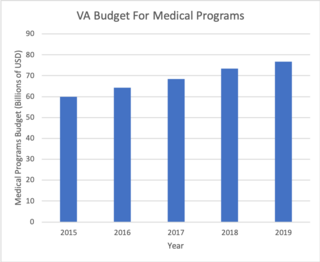
The Veterans Health Administration (VHA) is the component of the United States Department of Veterans Affairs (VA) led by the Under Secretary of Veterans Affairs for Health that implements the healthcare program of the VA through a nationalized healthcare service in the United States, providing healthcare and healthcare-adjacent services to Veterans through the administration and operation of 146 VA Medical Centers (VAMC) with integrated outpatient clinics, 772 Community Based Outpatient Clinics (CBOC), and 134 VA Community Living Centers Programs. It is the largest division in the Department, and second largest in the entire federal government, employing over 350,000 employees. All VA hospitals, clinics and medical centers are owned by and operated by the Department of Veterans Affairs as opposed to private companies, and all of the staff employed in VA hospitals are government employees. Because of this, Veterans that qualify for VHA healthcare do not pay premiums or deductibles for their healthcare but may have to make copayments depending on what procedure they are having. VHA is distinct from the U.S. Department of Defense Military Health System of which it is not a part.
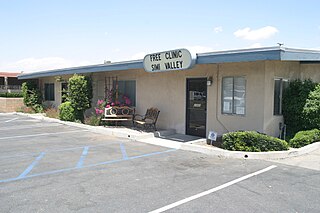
A free clinic or walk in clinic is a health care facility in the United States offering services to economically disadvantaged individuals for free or at a nominal cost. The need for such a clinic arises in societies where there is no universal healthcare, and therefore a social safety net has arisen in its place. Core staff members may hold full-time paid positions, however, most of the staff a patient will encounter are volunteers drawn from the local medical community.

The University of Pittsburgh Medical Center (UPMC) is an American integrated global nonprofit health enterprise that has 92,000 employees, 40 hospitals with more than 8,000 licensed beds, 800 clinical locations including outpatient sites and doctors' offices, a 3.8 million-member health insurance division, as well as commercial and international ventures. It is closely affiliated with its academic partner, the University of Pittsburgh. It is considered a leading American health care provider, as its flagship facilities have ranked in U.S. News & World Report "Honor Roll" of the approximately 15 to 20 best hospitals in America for over 15 years. As of 2016, its flagship hospital UPMC Presbyterian is ranked 12th nationally among the best hospitals by U.S. News & World Report and ranked in 15 of 16 specialty areas when including UPMC Magee-Womens Hospital. This does not include UPMC Children's Hospital of Pittsburgh which ranked in the top 10 of pediatric centers in a separate US News ranking.
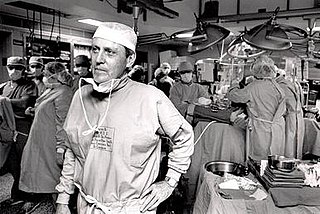
Thomas Earl Starzl was an American physician, researcher, and expert on organ transplants. He performed the first human liver transplants, and has often been referred to as "the father of modern transplantation." A documentary, entitled "Burden of Genius," covering the medical and scientific advances spearheaded by Starzl himself, was released to the public in 2017 in a series of screenings. Dr. Starzl also penned his autobiography, "The Puzzle People: Memoirs Of A Transplant Surgeon," which was published in 1992.
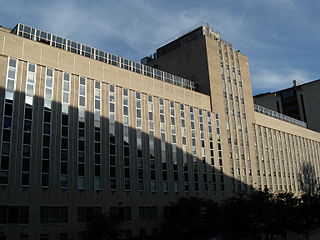
The University of Pittsburgh School of Medicine is a medical school of the University of Pittsburgh, located in Pittsburgh, Pennsylvania. The School of Medicine, also known as Pitt Med, is consistently ranked as a "Top Medical School" by U.S. News & World Report in both research and primary care. It was ranked 13th in the category of research and 14th in primary care by U.S. News for 2020 and is separately ranked 17th in the Academic Ranking of World Universities list of best medical schools in the world. The school encompasses both a medical program, offering the doctor of medicine, and graduate programs, offering doctor of philosophy and master's degrees in several areas of biomedical science, clinical research, medical education, and medical informatics.
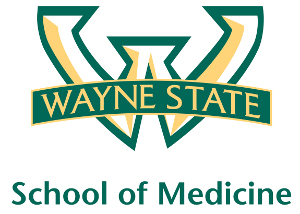
The Wayne State University School of Medicine (WSUSOM) is the medical school of Wayne State University, a public research university in Detroit, Michigan. It enrolls more than 1,500 students in undergraduate medical education, master's degree, Ph.D., and M.D.-Ph.D.. WSUSOM traces its roots through four predecessor institutions since its founding in 1868.
Drexel University College of Medicine is the medical school of Drexel University, a private research university in Philadelphia, Pennsylvania. The medical school represents the consolidation of two medical schools: Hahnemann Medical College, originally founded as the nation's first college of homeopathy, and the Woman's Medical College of Pennsylvania, the first U.S. medical school for women, which became the Medical College of Pennsylvania when it admitted men in 1970; these institutions merged together in 1993, became affiliated with Drexel in 1998, and were fully absorbed into the university in 2002. With one of the nation's largest enrollments for a private medical school, Drexel University College of Medicine is the second most applied-to medical school in the United States. It is ranked no. 83 in research by U.S. News & World Report.
Allegheny Health Network (AHN), based in Pittsburgh, is a non-profit, 14-hospital academic medical system with facilities located in Western Pennsylvania and one hospital in Western New York. AHN was formed in 2013 when Highmark Inc., a Pennsylvania-based Blue Cross Blue Shield insurance carrier, purchased the assets of the West Penn Allegheny Health System (WPAHS) and added three more hospitals to its provider division. Allegheny Health Network was formed to act as the parent company to the WPAHS hospitals and its affiliate hospitals. Highmark Health today serves as the ultimate parent of AHN.

Hahnemann University Hospital was a tertiary care center in Center City Philadelphia. It was the teaching hospital of Drexel University College of Medicine. Established in 1885, it was for most of its history the main teaching hospital associated with its namesake medical school, Hahnemann Medical College and Hospital, founded in 1848 and named for Samuel Hahnemann, the founder of homeopathy. Hahnemann University Hospital was fully accredited by the Joint Commission on Accreditation of Healthcare Organizations.

The Lake Erie College of Osteopathic Medicine (LECOM) is a private medical school and academic health center in Erie, Pennsylvania. LECOM has a Branch Campus in Bradenton, Florida. LECOM has Additional Locations in Greensburg, Pennsylvania, and Elmira, New York. Founded in 1992, LECOM confers medical (D.O.), dental (DMD), podiatry (DPM), pharmacy (PharmD), as well as master's degrees in the health sciences.
Street Medicine Institute was formed in 2008 by Dr. Jim Withers. The term Street Medicine, in this context, was coined by Dr. Jim Withers who has been one of the leaders in the movement. His program, Operation Safety Net in Pittsburgh, Pennsylvania, has hosted the annual International Street Medicine Symposium in various cities since 2005.
Americares is a global non-profit organization focused on health and development that responds to individuals affected by poverty, disaster, or crisis. The organization addresses poverty, disasters, or crises with medicine, medical supplies and health programs.
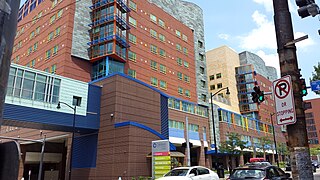
UPMC Children's Hospital of Pittsburgh (CHP), popularly known simply as Children's, is part of the University of Pittsburgh Medical Center and the only hospital in Greater Pittsburgh dedicated solely to the care of infants, children, teens and young adults through around age 26. UPMC Children's also sometimes treats older adults that require pediatric care. The hospital is affiliated with the University of Pittsburgh School of Medicine and features a state-verified level 1 pediatric trauma center, one of four in the state. CHP also has a rooftop helipad for emergent transport of pediatric patients.

UPMC Mercy is a main hospital facility of the University of Pittsburgh Medical Center (UPMC) and is located in the Uptown section of the city of Pittsburgh, Pennsylvania, adjacent to Duquesne University, and a few blocks from the PPG Paints Arena and downtown Pittsburgh. It is the first chartered hospital to have been founded in the city of Pittsburgh and it is also the first hospital in the world to have been established by the Sisters of Mercy. It is also the first teaching hospital in the region, accepting residents to teaching positions beginning in 1848, one year after opening its doors.
Sanyukai Nonprofit Organization Inc. (山友会) is an official nonprofit organization dedicated to the aid of the homeless population in Tokyo, Japan. Sanyukai's services include a free clinic, as well as an outreach program which distributes food and clothing to the homeless in the area.
Conemaugh Health System, a member of Duke LifePoint Healthcare, is the largest health care provider in west central Pennsylvania, with multiple hospitals, physician offices, and outpatient centers in eleven counties. Conemaugh Health System is located in Johnstown, Pennsylvania.
The Combat Stress Intervention Program (CSIP) is a 3-year United States Department of Defense-funded research program to study mental health issues experienced by veterans returning from Operation Iraqi Freedom and Operation Enduring Freedom. The $1.5 million study, which is managed under the Military Operational Medicine Research Program, focuses on Combat Stress Disorder, Posttraumatic stress disorder, and other post-deployment transitional challenges. The study also focuses on developing resources and solutions for such veterans.
The concept of street outreach to individuals that are experiencing homelessness is a classic example of a form of outreach. Those who experience homelessness have a variety of complex issues that incite the need for specific forms of care. As such, street outreach is challenging work. There are multiple governmental and non-governmental agencies that have sought to engage in this work because of the understanding that unhoused people tend to have increased barriers to access traditional services. Street outreach comes in different forms, from people walking around carrying supplies or offering resources, to mobile health clinics with teams of medical volunteers driving around and offering services. Regardless of its form, the essence of street outreach is the desire to meet people where they are at, build deep trust and connections, offer support, and reinforce the human dignity and respect that is deserving of all people. The core elements of effective street outreach include being systematic, coordinated, comprehensive, housing-focused, person-centered, trauma-informed, culturally responsive, as well as emphasizing safety and reducing harm.










